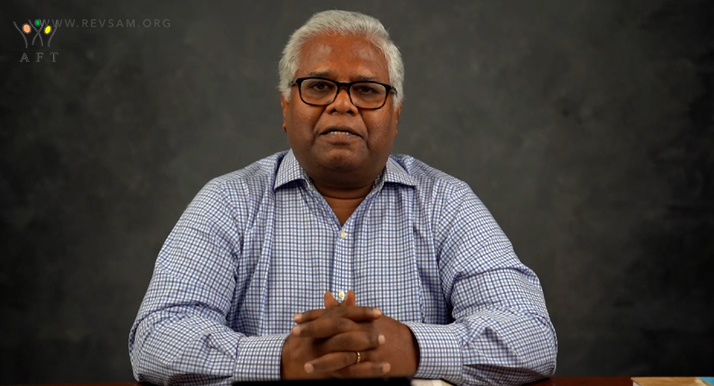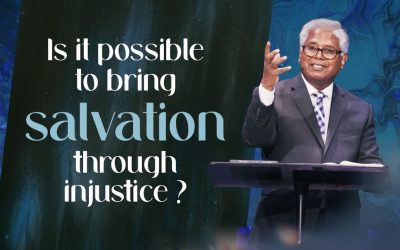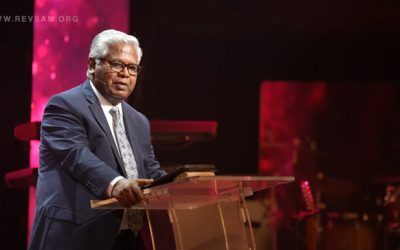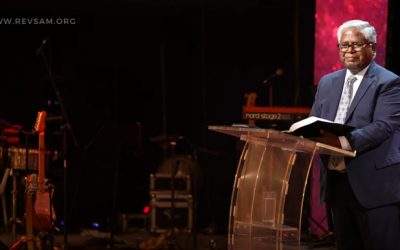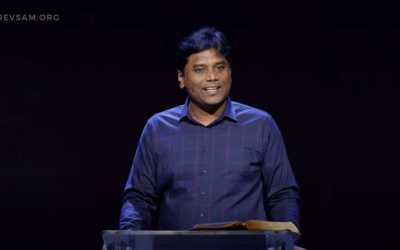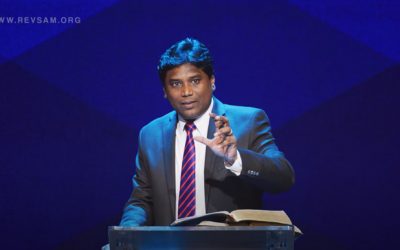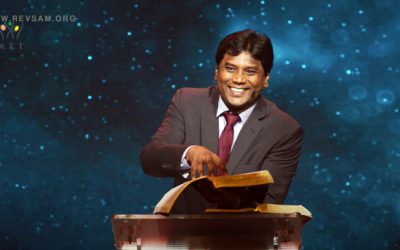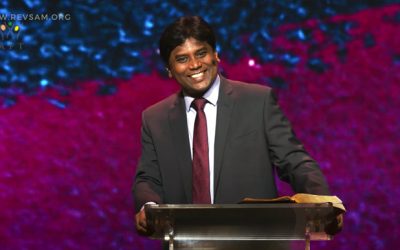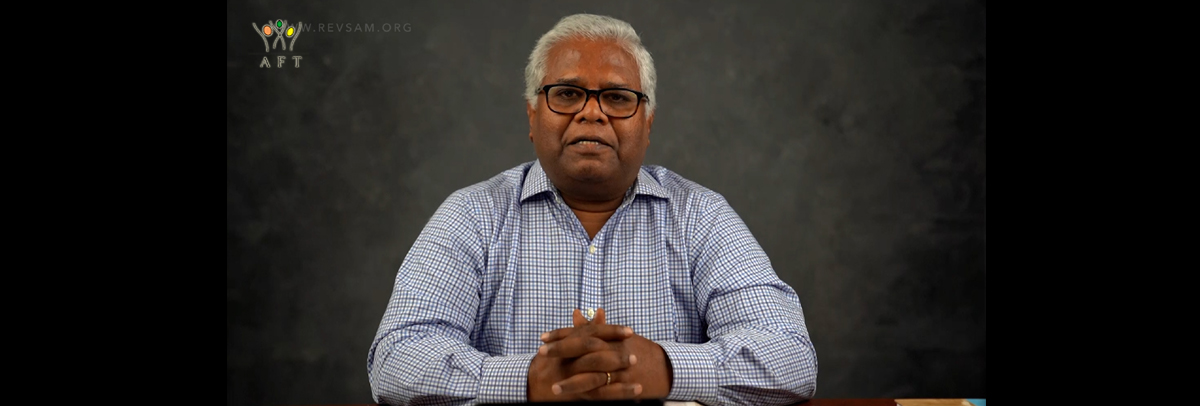
Abounding Grace (Vol 28) – Sonship
Sunday English Service – 10 JAN 21
Transcript
We’ve been doing a series on grace and we’ve titled the series as “Abounding Grace”. The title comes from Romans chapter 5, verse 20, where the Apostle Paul says, “Where sin abounded, grace did much more abound.” It means that when sin comes into a person’s life, it abounds; it takes over, destroys, ruins everything. But when God’s grace comes into a person’s life at the time of salvation, it begins to restore everything; it abounds more than sin. That means it works more powerfully than sin, putting everything back together and making everything more beautiful and wonderful than it ever was.
So, this teaching is about how God’s grace works in people’s lives to change them. So, we went to many places to look at that and been on a long journey already and finally, we came to Luke, chapter 15. In Luke 15, we have three wonderful parables of Jesus. But the context in which these parables were told, is very important and we have to remind ourselves every time about that. We’ve been at Luke 15 for the last several weeks. What is the context? The context is Jesus’s preaching; sinners and tax collectors are taking the front seat; they came near to him to hear him – that’s how the English Bible puts it. And Pharisees and Scribes see that the sinners and tax collectors are coming to the front, and they are eager to hear Jesus and Jesus is accepting them, was a troublesome thing for them. They thought, we don’t accept these people, we don’t even give any place to these people. Why should they come into a spiritual meeting like this? If He’s the Man of God, should He not know that He should not accept these social rejects? So, they’re murmuring concerning this and Jesus, in answer to their murmuring, He gives these three parables: The Parable of the Lost Sheep; The Lost Coin, and The Parable of the Prodigal Son. His answer has to do with, who can be admitted into this Grace Community. God is creating a grace community; Jesus has come to inaugurate a Grace Community, “I will build My church”, He said. That’s the grace community. In this whole world, there is a community, a very special community, called Grace Community. These are people touched by the grace of God; have experienced God’s grace; they’ve come into the knowledge of God; been changed. They didn’t come by their own qualification. They didn’t come in because they’re so good and so holy, and so religious. They came in because they were sinners but were saved by God’s grace. They had God’s helped; tasted God’s grace and they were admitted and this is the way the Grace Community is formed. This is what Jesus is trying to tell them. This Grace Community, called the church, is not a bunch of religious people that are claiming their own self-righteousness as their qualification for belonging to this community. The church is a Grace Community where people have been touched by the grace of God and changed by the grace of God. All right.
In this, we’ve been looking at the Parable of the Prodigal Son. For several weeks, we’re been already at it. Last week, we looked at one particular truth there, and that is the truth about repentance. The Parable of the Prodigal Son is a very wonderful parable that covers many wonderful truths. We thought about repentance and I pointed out repentance is in that story. It says, this young man, this prodigal son, after he went and squandered all his wealth and ended up with nothing, at one point, he became so desperate; he came to his senses, he realized how good the Father has been (Father’s house has been) and he remembers and wants to go back. He came to his senses. That’s what repentance is and we all experience that, you know. That’s one of the first works of God’s grace in a person’s life. God’s grace causes a person to turn around, as the psalmist said, “Turn us all out, that we may return to You”. So, God’s grace, when it begins to work, and that’s one of the things that God’s grace does; it causes us to turn around, helps us to come to our senses. Otherwise, we won’t be able to do it on our own. Come to our senses, so that we return to God. We come to God, whom we have abandoned, to go our sinful ways. We return to God and come to him and then we are received by Him. We had looked at that last week. But today, we’re going to look at yet another truth.
Today, we’re going to look at, what is called: “Sonship”. A great, wonderful Christian doctrine but that is brought to our attention here in this parable – the doctrine of sonship. Where is it in the story? It is there in verse 24, where the father in the story says, “My son was dead and is alive again”. He is trying to give the reason for why the celebration is happening. Says, “The celebration is happening because my son was dead but now is alive”, he says. And even the son, when he came back, he said to the father, “I’m not worthy to be called your son”. So, the issue of sonship is raised here. He says, “I’m not worthy to be called your son”, and the father says, “My son was dead but now he’s alive”. Now, was he really literally dead? No, certainly not because he’d lost everything, and he came back alive. That’s why the father is happy, that he’s come back alive, and he’s celebrating it. So, he’s not literally dead but in some ways, he has ceased to be his son. That is why the son also feels like he cannot be called as a son anymore. And the father says, he was dead; in some way, he was dead. So, we’re going to look at what sonship means, so that we can understand this whole issue, as it is raised here, in this parable, as well as this will help us to understand what God has given to us, through Jesus, in and through the redemption. That is explained in the doctrine of sonship: what has been given to us in and through Jesus Christ, and the salvation that comes through Jesus Christ, as He makes us, the children of God or sons of God. That’s very important; that’s a wonderful truth. The truth about how we are all sons of God, and what sonship means. It’s something that must be understood, then we’ll understand this doctrine itself – not only this story, but the doctrine itself. So, we’re going to look at several things: One – we’re going to look at what sonship means. Then we’re going to look at what sonship brings in practice – what are the benefits; the practical benefits of sonship. Then we’re going to look at what sonship accomplishes, as we see how it creates a wonderful, new community. All right.
So, let’s look at what sonship is, first. I told you, the father says, “My son was dead and is now alive” and the son also says, “I’m not worthy to be called your son”, right? This shows clearly, that sonship is something different from just being a son of a father. We all come from a family and we are a son to a father. Biologically, we are born and we belong to that family; there is a father and he’s got a son. We understand what father and son relationship is all about. But in that ancient culture, being a son is something more than just biologically belonging to a family. These days, we don’t think about it like that. It was something that was much more important than what it is in our culture today. Because to be a son that ancient culture, the culture of the biblical times, was so different and is so important. To be a son, you’ve got to fulfil two duties – perform two duties – that are given to you as a son; that’s what makes you a son. So, to be a son is a status; it’s a position that you hold, where you perform these duties. That is how sonship is viewed in that culture. Sonship doesn’t mean that he is bound to this man, therefore he’s his son. No, that’s but very primary. What sonship means: that he has certain responsibilities; he has got a job to do; he’s got a duty to perform. And as he performs the duty, as he takes up his position, and fulfils his obligation, that’s what makes him a son. That’s what sonship is all about. It carries responsibilities; tasks that he must do. Let me mention two of them.
One: it was the job of the son to carry the family’s name. The name of the family is very important. The name meant everything. Today, the name only means that it distinguishes us from others. Name is used only to tell who’s who, that’s all. But in that culture, name is something very important and name is everything. A name meant a whole lot more than what it means today. The family name in those days was what the family stood for. It represented the values, the beliefs, the culture, and the reputation of the family. A son was someone who knew that it was his job to carry on that family name, represent that family in that way; represent the beliefs of the family, the values of the family, the culture of the family, the reputation of the family, and carry that name forward in that way. That’s the responsibility of the son. A son meant that he is the carrier of the name. He’s the one that bears that name, and takes forward that name to the next generation and on.
Secondly, it was the son’s job carry on the family’s business. Now, only if we understand this, then we’ll understand how the Old Testament and New Testament tells the stories of how the assets are distributed within a family and so on. Because it seems strange to us when we read in the Bible, that oldest son in that culture got double the share. So, there are many sons in the family, two shares straightaway went to the oldest son. The rest of them shared the rest of it. So, all the rest of them, got a lot less than the older one. And if you are a girl in the family, you get nothing. So, when we hear this kind of story, we feel that it’s a tremendous inequality and we wonder why such inequality existed in those days. And in order to understand that, we need to understand how things worked there. In order for families to survive, back in those days, you had to be very strong. An intact family, a family with a livelihood, a family of some means. The livelihood and the means; the properties and what you produce through those properties, all of those things are very important and how the family is intact, is very important in order for the survival of the family. But today, if you have two or three children, you will divide all your assets among them equally (most probably) and give it to all of them. And they will take it and they will have children, they will divide it among their children and on and on it goes, for maybe one or two generations. After that, everything you gave is over because it’s been distributed and it has been reduced to nothing, really. And we don’t mind that because a lot of it we have in cash, jewelry, that kind of thing. And even properties, nowadays, is not held from one generation to another. We buy, we sell, we even buy for investment, for just a period of time and then sell. So, we think about everything differently. It’s all fluid, fluctuating all the time. But back in that time, in the society, when properties were held by families, it was held for generations, for hundreds of years, they’ll hold it. And they have to hold it because their livelihood depended on it, the stability of the family depended on it, the survival of the family, the family’s name, depended upon how they dealt with this property, and what they did with these things. They had to have a very strong, intact family, strong livelihood. Must be a family with livelihood; it has to be a family with some means and it all has to be maintained over generations.
So, things were done in that way. That is why to be a son in the family meant something greater than what it means today and we need to understand that. Because the son was responsible to do this; to carry on the family’s business, to do with the land, and the cattle, and all the things that they have and produce and continue to generate income and continue to manage and maintain everything that they have. The oldest son is given that responsibility. Therefore, to be a son, is a position. It’s a status. So, sonship is a status and a position. It’s like an office, almost, where you perform certain duties. So, it’s not just that you’re born to that father and belong to the family. It is an office; it is a position; it is a status that is given to you. That is how they looked upon sonship in those days.
Now, the New Testament talks about sonship. In the New Testament, the Apostle Paul takes it and uses it to illustrate our sonship; how that we are children of God, that we are sons of God. And why does he go to this analogy of sons of God? He’s not trying to prove that their culture is right, and what they did is their culture is right, you know. No, that’s not the point. They’re using that culture to illustrate a point; a spiritual truth. So, he goes into it, and he says that we are children of God. And why is he interested in saying that ‘we are sons’, particularly? Why does he take that metaphor of the son, particularly? Because he wants to say that, if you are sons; then you are heirs. He wants to bring us to. Now, turn over to Galatians, chapter 3. Let me read to you a few verses, verse 26, onwards, and all the way to verse 7, chapter 4 but I’m not going to read all the verses. I’m going to just read verse 26, and then 28, and then verse 4 to 7. All right. In fourth chapter.
Now, let me start with chapter 3, verse 26: “For you are all sons of God through faith in Christ Jesus”. You’re all sons of God through faith in Christ Jesus. And then, verse 28, he says, “There is neither Jew nor Greek, there is neither slave nor free, there is neither male nor female; for you are all one in Christ Jesus”. “You’re all sons”, he says, because you put your faith in Jesus. The next verse, if you read, it’s talking about those who have been baptized into Christ; who have put their faith into Christ. So, “We are all sons of God”, he says and it doesn’t matter which ethnic group you belong to, whether you are Jew or Greek, the nationality didn’t matter, which languages won’t matter; whether you’re a slave or free, it didn’t matter. In those days, there were such categories – slaves were there; free people were there. It didn’t even matter whether you’re male or female. “You’re all sons”, he says. You’re all sons.
Now, when the Bible talks about sons and sonship, sometimes women are upset because they say the Bible is so gender-biased. They say everything is put forth in terms of the male descendant, and so on. “Sons”, why not daughters? Daughters are never mentioned; sons are mentioned, they say, and are given importance. If you’re sons, then you’re heirs. What about daughters? In that society, daughters got nothing. So, does the Bible believe that that culture was right, that the Bible endorses? Some people think it seems to endorse. No, it’s not. The Bible is not talking about the culture; simply using what was already in existence as practice in a culture, to tell us a spiritual truth. In that culture, the son was a position, it was a status. It’s not just about being a son, biologically, it was a position and a status. He carried some responsibilities. He carried the name of the family, and he carried on the business of the family. The survival of the family rested and depended upon him, because he’s got the carry on the wealth and work at it, to sustain the entire family. So, the responsibilities given to the son and therefore, he carried an important position. That’s all it is saying. And people such as Paul, you take that and use that to show how, we are sons. Because we believe in Christ, we are sons of God. And as sons of God, there is no difference whether you’re Jew or Greek, it doesn’t matter; whether you’re a slave or free, it doesn’t matter; whether you’re male or female, it doesn’t matter. You’re sons. Thank God he said that, otherwise women will be very upset. He says, you are sons. He’s telling the ladies, you are sons. In other words, he’s saying whatever rights and privileges belong to a son, in that culture, belongs to you also in Christ. When it comes to blessings in Christ, he’s telling the women, all the blessings belong to you also. It does not matter that you’re a woman. In that culture, maybe they left out the women but not Christ. He doesn’t leave out the women. They left out a lot of people, you know. The Jews left out the Gentiles; the free people left out the slaves; men left out the females, but not God. If you put your faith in Christ, you are sons and whatever is entitled to the son, as privileges, comes to you also. You are a son, even though you’re a daughter; you have the all the privileges and blessings of the son. That’s what he’s trying to say.
So, there is neither Jew nor Greek, slave or free, male nor female, for you are all one in Christ. And then, in verse 4, in chapter 4, he says, “But when the time had fully come, God sent his son, born of a woman, born under the law, to redeem those under the law, that we might receive the full rights of sons”. That we might receive the full rights of sons, this translated is. The New King James Version says, “That we might receive the adoption as sons”. So that we may be adopted into the family of God, as sons So that when we become sons, and be entitled to all that belongs to sons in that culture, according to that culture; be entitled to everything that a son is entitled to. So, Christ Jesus came, born under a woman, born under the law, to redeem those, under the law. Why? So that we may receive full rights as sons; so that we may receive adoption as sons, he says.
And then, let’s go on. “And because you are sons, God sent the Spirit of His Son into our hearts – the Spirit who calls out, “Abba, Father!” Seem Jesus calls God, Abba Father and God has sent the same Spirit into you because you are sons. God sent the Spirit of His Son into our hearts also, so the Spirit calls out, “Abba Father!”, so you’re no longer a slave but a son. And since you’re a son, listen to this, God has made you also, an heir. This is what he’s driving at. He wants to talk about how you and I are sons. Men, women, Greeks, Jews, slaves, free; all of us are sons, in a sense that all of us are entitled to the inheritance that belongs to the heir. We are sons, and therefore, we are heir. And therefore, the inheritance that God has for us, belongs to all of us, who have put our faith in Christ. That’s the way the Apostle Paul deals with it. And this is tremendous, because in that culture, religious philosophies also, mostly held that God was like a king, and people are like ordinary subjects – the lowly subjects before God. So, you just come before God, bow before God, worship God and do certain things, as far as rituals and ceremonies before God. That’s how you behave before God. That’s how you think of God, that He’s a big King, and that you are just an ordinary subject. But to hear the God of Abraham presents Himself as a Father and He says that through Jesus Christ, you can be sons to this Father, not only sons, then heirs to the Father, so that you may receive all the blessings of the Father, that the Father gives to the sons. It’s a father-son relationship. That’s what is taught by the God of Abraham, the father-son relationship.
Now, this offers the kind of intimacy with God, that nothing else in that world offered. An intimacy with God. Father-son – there can be nothing more intimate than that. A close, intimate relationship, and also an honor in the presence of God. You just don’t come before God and appear before God as an ordinary subject of a Great King. You come before God as His children, as sons. And nothing, no religious philosophy of that time offered something like that. This was unique. So, here it is. Sonship, as it is understood in those days, sonship is not that a person is a son of so and so. It doesn’t end with that. It goes much more. It goes into how he carries certain responsibilities, he is in a position, he is in a status, he’s got to fulfil certain duties. Therefore, being a son, or sonship, is a status, is a position, it’s almost like an office.
Secondly, what are the practical benefits of such sonship? Several benefits. Let me mention three or four benefits of sonship. One is security. Security is a big word; it includes a lot of things underneath it. Security mean safety, refuge, sanctuary, haven, safekeeping, retreat, confidence, wellbeing, all these words. So, when you come to put your faith in Christ, the practical benefit, as a result of putting your faith in Christ is security. That means you have arrived at a safe place. You have taken Him as your refuge. He becomes your sanctuary; you are safely kept. Now you can have confidence, you can be bold, you can have courage, you don’t have to be afraid. You have entered into a general state of wellbeing in that way. And this is not something that happens gradually. It is not a gradual change in nature. It is a sudden change in legal status – that’s how the Bible presents it. Not a gradual change in nature but sudden change in legal status. I hope you understand what I’m talking about. A gradual change will take place over a period of time, little by little, little by little, right? As the days go by more and more. That’s a gradual change. No. The Bible says when you put your faith in Jesus, when you believe in Jesus as your Lord and Savior, that very moment, your legal status is changed. There is a sudden change in legal status. You’ve been adopted – that means it’s a legal thing. That means you’ve been outside of the family; you had no rights to anything before. But now, you have every right to the inheritance. You become the heir, because you’re a son. All of a sudden, your position changes; your legal position changes; your legal status changes. Now, this is very difficult, in practical terms, for Christians to understand.
I remember when I was growing up, I went to study the Bible and so on. There were some things that was shocking to me to learn, because I learned that when I was growing up as a believer. Yeah, we talked about how God is our Father, and all that but not in any great detail. We just mentioned, God is our Father but the thing is, we didn’t really understand all these things, you know. And we didn’t see ourselves as sons, with great privileges and blessings, heirs with an inheritance, and that kind of thing, you know, was hardly ever mentioned. And then we were rather given another picture. That is, we were never given this picture of security, that we have now gotten into a secure position, that we are in Christ, that we are safe in Him. And that He is our everything and so on. We were more like that younger brother who came back to the Father in that prodigal son story. He came back saying, “Father, I’m not worthy to be called your son”. I’m not worthy – which is true. He was not worthy to be called a son. He says, “I’m not worthy to be called your son. Make me like a hired servant. Let me be your hired servant. Like I said, the other day, he wants to work and earn his way, earn his merits. He has damaged a lot. He has taken the father’s wealth and squandered it. He wants to earn it and pay it back. “Give me a chance”, he says. I don’t want any mercy from you;
I don’t want any grace from you. I just want a chance to work my salvation. That was his approach. Not worthy to be called your son. His position was, I don’t want any sonship; I don’t ask for sonship. I’m not asking to be a son. I’m not wanting to be a son. I don’t deserve it. You can’t reinstate me as a son because I am nothing in this family. I’ve already taken my wealth and totally ruined it. Everything that is there now, belongs to the elder brother. So, I have nothing. I cannot be a son. If I am a son, then I must be heir; I must be getting an inheritance but there is not one piece there. Everything I’ve taken and squandered, so I’m not telling you to consider sonship for me. Consider me as a hired worker. Now, that’s the way we thought as we were growing up. That we were not worthy. That if God will somehow forgive our sins and take us in. If He will just give us a chance. And we would pray, something like, “God, I’m going to try to live a good life from now on; I’m going to be better than ever. I’m going to go to church regularly; I’m not going to miss one Sunday. I going to read my Bible; I’m going to pray and I’m going to do everything possible to live a Godly life. I’m not going to keep away from those sins; I’m going to try my best, oh God. I’m going to try my best to pull it all together. And maybe someday, in the end, God, you’ll take me to heaven”. Truly, that was our approach. We believed that somehow, if we managed to be good, in the end, God will somehow take us to Heaven. We were hoping for that. And even that we were not sure. They used to talk about how two people would be in the field: one will be taken; the other will be left. And I was mostly sure that I will be the one that will be left, among the ones that have left. I remember, many times when they spoke about how Jesus is going to come and so on, I prayed, “God, don’t do that now. Just give me three more days, I’ll set everything right”. I was never ready. I felt like I was never ready. I never felt like I was qualified enough to go to heaven. I never felt like I had any kind of right; I had any kind of inheritance. I never thought of myself as an heir. I never thought that I had an inheritance. I never thought I was anything. I only thought I was an unworthy sinner, that I am trying my best to live for God. That’s the way I thought. And it’s amazing, what kind of change comes over people, when they begin to understand that they are not like the hired servants. They are sons.
See, there is a big difference between a hired servant and a son. A hired servant is an employee. Let’s use the modern word – ‘employee’, right? When you work for someone, and when you’re a son are two different things. When you work for someone, you better do your work right and you better please the boss and do you work correctly. If you don’t work properly, if you don’t do your things correctly, well then, you’ll be fired, one day. Right? That’s the hired servant or an employee. But a son is different. They will never fire a son. The father doesn’t fire a son. When the son goes wrong, when the son doesn’t do well, and the son doesn’t do the right thing; when the son is not fit for the job, is not proving himself fit for the task, the father gets concerned about that and he begins to pay attention, more attention, because he loves the son. He wants to give him whatever support he needs and he wants to give him more training. He wants to do something for him, to make him a better person, and a better worker, more successful than ever. So, the failure of the son, draws the attention of the father and the love and compassion of the father, so that the father pays more attention and comes to his aid and helps him. The failure doesn’t cause the father to reject them. The failure causes the father to come to him, to help him. But the employer is different. They will put up with you for a few times but after that, they may dismiss you. When it comes to an employee, there will be a limit to patience. But to a son, there is no limit to patience. Forever they put up with him and they try to work with him and make him right. As soon as I understood this, then I understood my relationship with God. God is not standing there with a big stick, trying to break my head every time I make a mistake. God is not trying to fire me, every time I make a mistake. God is not trying to kick me out, every time I make a mistake. God is trying to help me. He’s interested in me; I’m a son. He wants me to excel in everything that I do. He wants me to succeed. He wants me to do better and better and better and grow up. He’s aiding me, he’s helping me, he’s on my side. He’s not just sitting there judging me with a big stick, sitting ready to smack me on my head, every time I do something wrong. That’s the kind of picture that I used to have but it had to be changed. And slowly my picture changed in my head about God. Once you understand that, then you really begin to change, then you begin to really live for God. See, the mentality is the servant is one thing and the mentality of a son is another thing. The servant mentality is a mentality that says work for the pleasing of the supervisor. Oh, he’s looking, therefore, work. Well, he’ll be asking, so I work – that kind of thing. But the son is not like that. He works because he feels a sense of ownership, feels a sense of belonging. There’s a totally different attitude. This attitudinal change, when it comes into a believer and the believer looks like the son, then living the Christian life becomes
a very wonderful, enjoyable thing, because he thinks, I’m a son; God’s son. I am in a very high place, I’m in a very high position and given a very big privilege. Therefore, I cannot get myself involved in all these kinds of sins and petty things and so on. I need to live for God and I need to live that highest kind of life. He begins to think on different terms. Bu the servant thinks, as minimum requirement – fulfilling that minimum requirement. I’ll go to church regularly; I’ll pray every day; I’ll read my Bible – that kind of minimum requirement, he thinks. But the son thinks of living wholeheartedly and fully for God. That’s the attitudinal change.
Martyn Lloyd-Jones, a great preacher in London, in the city of London, back in the 40s, 50s and 60s, in the 1900s, used to ask a standard question to people that came to him for help. When they came for prayer, when they were seeking God, and they come to him for council and so on. He’ll ask them one question, standard, diagnostic question. He said, “Are you a true Christian – are you a child of God? And he said, in England, basically people answered something like this, many times. They would say something like, “Well, I’m trying”, you know, because they all grew up in a Christian home, or Christian society. They think that it’s some kind of a little bit of Christianity in them, but they’re not sure. And they’d say, “I’m trying, I’m trying, Pastor. I’m trying to be a good Christian more and more”, so on. And he says, immediately when they answer like that, immediately I know, that they don’t understand what it means to be a Christian at all. They don’t have any idea of what it means to be a Christian at all. So, it’s very important to understand this idea of sonship and this truth of sonship.
Many people have become sons; have put their faith in Christ. They’ve become sons but sonship is not taught to them. The blessing of sonship is not taught to them; the privilege of sonship is not taught to them, so they’re looking at themselves as hired servants, and they’re trying to do this minimum-pleasing-God business, you know. Trying to just barely qualify and make it to heaven and that kind of a thing, and not wholeheartedly living for God, and so on. So that is one thing. One of the blessings of sonship is security. That you know that you are a child of God, Son of God, and from that security position, you work. You’re not working from an insecure position. When insecurity is there, you wonder whether you’re going to make it to heaven, whether you’ll ever go to heaven, and you’re doubtful. Therefore, from that position, you’re trying to live your Christian life. You can see how miserable it will be. But when you understand sonship, you come into a position of security and from that position you begin to live. You know that you’re going to go to heaven. You know you belong to God. You know that God loves you. You know that you’ll make it because God is your helper, that God is on your side. That makes your Christian life totally different.
Secondly, intimate access is another blessing of sonship. I hear about a preacher who went to some country and took a little orphan girl and adopted her. The girl understood pretty quick, that he is the father now legally – adopted father. She knows that she’s adopted; she understands that he is the legal father. So, she goes with him and lives with him but she’s very standoffish. I guess she doesn’t feel very comfortable, she doesn’t feel naturally attached to him. So, she’s kind of standoffish and it bothers him that she’s not getting used to this. But one day, that little girl came running to him as he was sitting in his office and came to him and said, “Daddy, I need a shoelace – a new shoelace. I don’t have a shoelace”. And, he says, “I couldn’t describe the thrill that I had, just hearing you say, ‘daddy, I want a new shoelace’”. It so totally pleased me that should come for something as little as a shoelace. Because when children really believe that this person is the father, they’ll come to that person for every little thing, as well as great thing. Not just for some great things but, even for very little things, because it’s their father.
I remember when John F Kennedy was president, they used to show the pictures of his two little children at that time, running up to his office and sitting on his lap, but he’s buttoning them up and he’s making sure they’ve got their shoes on and so on, in his office. He’s one of the greatest leaders in the world. But the children don’t have to have anybody’s permission, they don’t need to have any appointment. They have intimate access. They have access directly to him. They can go, they could sit on him and they can count on him to button up their shirts and get their shoes on. They can count on him to do whatever little thing they require at that time. That is what intimate access is about. So, you and I have that kind of access with God. We go to God for everything; He’s our Father.
Thirdly, the relationship that we have with God is a real relationship. You can see that in the believers. Have you seen a real believer, a real, true believer, pray to God? You will think that he’s talking to someone who’s really there in person, physically, even though God is not there physically, as far as that person is concerned, God is there. He’s talking, he’s having a conversation, he’s enjoying that conversation, he’s relishing the moment. And he’s just having a good time talking to God. That’s the kind of feeling you get when you hear a true believer, pray, because there is a real relationship. Because in prayer, the person believes that he can feel God’s love and that he can enjoy God’s presence, even though God is not there physically. He knows that in prayer, when he gets in prayer, he can enjoy God’s presence and God’s love and so on. The relationship with God, is very real. It’s not something that he just believes in, it is something that is real.
Fourthly, there is the future hope. Hope of an inheritance. See, that is why we’re called heirs. We’re sons and therefore, because we are sons, we are heirs. What are we heirs of? I told you that in ancient culture, the son’s status demanded that he take on the family business and carried on. Right. What is our Father’s business? Our Father’s business is that He’s taken on this world and He’s in the business of perfect in the world. Sin has destroyed this world; sin has destroyed people’s lives. When Adam sinned, not only human race plunged into sin, the entire creation also plunged into sin, and the creation is now longing for its redemption, even the human body is longing for total redemption. So, everything knows that it’s not in perfect condition and perfect state as God created it. Therefore, there is a push towards perfection. And God is moving towards it; God is working that out and he’s already worked out our salvation. He sent Jesus 2,000 years ago, He died on the cross, brought salvation, forgiveness of sins to us, so that we can come back to God today. We can have a relationship with God; our sins can be forgiven; we can become children of God and so on. But still, the world is an imperfect world; still, there are many things to change. It is not in the perfect condition that it was when God created it. That’s why we have all these problems in this world. That’s why there is sickness; that is when there is all kinds of difficulties and problems, wickedness; sin challenges in this world. World is a problem-filled world. And God is going to set that all right. There’s going to be new heavens and new earth one day, where there’ll be no suffering, no blemish, no stain. None of these things that we see today. And God is saying, that’s your inheritance. That’s what I’m getting ready to give you and that is what you’re going to rule and reign over. I’m going to make it like that and give it to you. That is your inheritance. Amen.
So, we have this future hope of an inheritance. Not only that, it says that Jesus came, born of a woman, born under the law to redeem us, who are under the law, so that we may receive adoption as sons, so that we may be made sons, literally. How are we made sons? How is somebody made a son? He’s adopted into a family. We’ve been adopted into God’s family, the Bible says. The word adoption is used in Galatians. Now, when you adopt a child normally in this world, you can take a child from somewhere and bring him to your home and you totally change him, literally. You can give him your language, your culture, your philosophy, your religion, your wealth. That will totally change that person. He may be born somewhere, under some language and under some culture but now he comes to your house and raised there, and he becomes a totally different person. Totally in sync with your culture, your religion, your thinking and your standard of living and all of that. You can change him in so many ways. You can give him a lot. But, do you know, you cannot give him one thing? And that is your DNA cannot be injected into him. Fundamentally, what he is made of does not change, because that comes from the biological parents. It comes from who he was born to. That cannot be changed. Fundamentally, that is there. These are all other things that can be added to it but fundamentally, that doesn’t change. Well that sometimes can present a big challenge. It can be a problem sometimes but when God adopts us into the family of God, that one thing that cannot be done is normal adoption, can be done. God’s DNA can be injected into us. Already, the Holy Spirit is given to us to live in our hearts and He’s in there and the Word of God is given to us. We are given the enlightenment so that we are changed from glory to glory to glory every day. We are being changed day by day so that we become more and more, in the image and likeness of God, every day. And one day, if we want to become just like God, we’re going to have the total resemblance of the Triune God. We’re going to have all of His love, all of His greatness, all of His goodness, all of His nobility, love and grace. Just look just like Him. Whatever He is, that we will be. As He is, so we are. That’s how we’ll become, and that is our inheritance. Praise God. So, these are the blessings that comes to us as a result of being sons. Sonship means that these are the blessings that belong to us as a result of being sons.
Thirdly, let’s go to this point about what this sonship leads to. It leads to a community being formed, of people who have had the similar experience of repentance, receiving sonship, given these basic privileges as sons inducted into God’s family, adopted into God’s family; a family is formed. A group of people come together, based on this. This is accomplishment of sonship. This is what grace accomplishes – it brings us together and forms this family.
Now, think about this story. I want to explain this a little bit – how this family is formed. See, when this boy comes back, the prodigal son comes back to the father’s house, he comes back with nothing. He took his portion of the wealth and total spent it. He does not have one cent; comes back penniless, in poverty. And the father receives him as his son. How can the father make him a son? Because if he’s a son, then he will be heir. What will he be heir of? Because everything that is left in the father’s house today, is something that belongs to the elder son because already the younger son, took all his wealth and went away and squandered it. Everything now in the house is the eldest sons. Already the robe, that he put on the younger son, belongs to the older son. The ring that he put on the younger son, belongs to the older son. The fatted calf they killed, belongs to the elder son because every cattle belong to him. All the land belongs to him; everything belongs him. All that is his property, is his share. How can he become son? How can the younger one now become son? He understood that. That’s why he said, “I don’t want to be a son; I’m not worthy to be called son; I cannot expect to be a son because I’m nothing. I have nothing. I can claim nothing. I’ve already spent everything. I can’t claim that, so I want to be a hired servant”, he says. But the father wouldn’t agree – he wants to make him a son. How would the father ever make him a son? If he’s a son, then he must be heir. What will he inherit? What can be given to him?
The only way that he could be made son and be an heir in the family now, after having squandered everything, is to take from the elder brother’s wealth and give some of it to this guy now. No wonder the elder son doesn’t want to come in and enjoy the party; he doesn’t want to join in. He hates this younger son. He says, “He spent and squandered his wealth with prostitutes and you’re having a party for him. I don’t want to be a party to that party. I don’t want to have anything to do with it; I hate this boy. I don’t want him around. He’s come to share my wealth now; he’s finished with his and he wants to take a portion of mine”. That’s why he hates him so much. With an elder brother like that, you wouldn’t want to go home. Because you know, that even if the father receives you, the elder brother will hate you and send you out. The elder brother in the story is such a hard person. And Jesus is telling the story and do you know that Jesus is our elder brother. Thank God, our elder brother is not the guy in the story; he is not like the guy in the story. Our elder brother is this person who’s telling the story of the prodigal son. Just imagine what Jesus would have been thinking as He told the story. I can imagine the scene: The Pharisees are there, the Scribes are there, the sinners, tax collectors are there. And here He is talking about the sinner, the prodigal son, and the Pharisees, the elder son. He’s talking about them and then He’s talking about Himself, ultimately. Basically, because He is the one that is telling the story. He knows very well that He’s going to die on the cross and give His life. That He’s the true elder brother. That is how they can come back into God’s family; we can come back into God’s family, and receive an inheritance because our elder brother’s willing to share His inheritance. He’s a good elder brother. He’s an older brother who left Heaven and left the Throne of Heaven and came down to earth. He suffered for us and died on the cross for us, took our curse, took our punishment for our sin, took our sin upon Himself, and died there in our place. Taking our place and taking our punishment, He died there. He even gave up His right as a son and came down. He cries, “My God, My God, why hath thou forsaken me?” And God turns His face away. That’s how much He comes down. Why? He even gives up His position as a Son and comes and suffers like this. Why? So that we, who are outside, can now become sons and be given the status as sons. Wow, isn’t that amazing?
Jesus is telling that story. He’s that true elder brother; He’s our elder brother. The Bible says, in the beginning, God gave everything to Adam, the entire inheritance to Adam and Adam plunged us all into sin, and lost, ruined our inheritance. And now, God sends the second Adam, this Adam will not fail; that is Jesus. He will not fail, He will not sin, He will not fall, He will not plunge us into sin, He will not lose our inheritance. It is safe in His hands, and God gives. The Book of Hebrews says that God keeps all our inheritance in His hands; it is safe in His hands. It is in Christ, that we have everything. He is our elder brother. He gives it in his hands and when we put our faith in Him, and believe in Him as our Lord and Savior, He joins us to this elder brother, as joint heirs. And this elder brother is different from this elder brother in this story. He doesn’t hate us; He doesn’t disown us. He doesn’t dislike us and He’s not the one that doesn’t want us. Not like this elder brother; He wants us. He wants to share His wealth with us; He wants to share his inheritance with us. We are joint heirs with Him. He has come to call us and bring us into His fold. See, that’s the story He’s trying to tell us.
See, the knowledge of that sacrificial love, is what changes us, and that is what will turn us into a family. That knowledge of the sacrificial love. When we realize that He took our place, instead of us, He died. And we are all alive today. And we are all blessed today, because of Him. When we come into that understanding, and we are all sons and we have an inheritance and all our blessings, flow from Jesus, our elder brother, who died on the cross for us, that unites us like nothing.
Let me just tell you a story. The story of a man named Ernest Gordon, who was a British soldier in World War II. He was captured by the Japanese and he was made to work with 1000s of others on what was called the ‘Death Railroad’ at the time. A railroad along the Valley of the Kwai River in Thailand. During World War II, prisoners of war were made to work on that railroad. The conditions were very awful and they were treated very badly and about 1000 to 2000 prisoners died, every five miles that was built. For every five miles of railroad built, about 1000 to 2000 soldiers died. There was death everywhere, dead bodies everywhere. That’s how cruel the whole experience was. It got so bad that Ernest Gordon writes in his dairy and says that men were all at each other’s throats. It just, at that point, it became a matter of survival. It was the law of the jungle, became like jungle. He says, “Death was everywhere and as conditions worsened, our lives became poisoned by selfishness, hate and fear, that ruled”. Initially, they were all together, it seems. They were huddled together, at first, because of fears and they believed that there were safety numbers. They thought, as prisoners, we had so many numbers, so that’s good. We have some protection because we are large in number, 1000s of us are there. But then, everything was gone, when they started seeing people die by the hundreds, and 1000s, and existence had become so miserable – “Odds so heavy against us”, he says. That nothing mattered, except to survive. “We lived by the rule of the jungle; it was survival of the fittest. That was the game”, he says. Everybody was his own keeper, and all the restraints of morality were gone. No consideration about what is right, what is wrong, what is decent and so on.
One afternoon, something happened. A shovel was missing at the end of the day. Workers were given equipment to work and one shovel was missing. The officer in charge became so enraged, that he demanded the missing shovel be produced or else terrible things will happen. When no one volunteered, saying, that they took a shovel, the man got very angry, very annoyed. And he got his gun out and threatened to kill every one of them on the spot. And seeing that, one man realized that he is indeed going to kill everybody. So, he stepped up and said, “Sir, I took it”. And when he said, “Sir, I took it”, the man put his gun back and took a shovel that was laying there and beat that guy in front of everyone else and beat him to death. And then they counted the equipment again; in the second count, everything was there, nothing was missing. That means, the first time, they miscounted it and they thought one shovel was missing. They made a mistake and because of that one mistake, he got so angry. As a result, this one innocent man died. Word spread like wildfire through the whole camp, that an innocent man was willing to die, to save everyone else. That incident, he says, had a huge effect. And, as a result, he says, “That jungle-like atmosphere changed and we began to treat each other like brothers”, he says. “Because we realized, this one man gave his life for all of us”. They were touched by that love of that one man, that concern of that one man. They were so totally changed. Another man was caught trading with the local people there, for medicines, for a dying soldier. And he was sentenced to death and he submitted to his death, reading the little Bible that he had. And cheering up the chaplain right before his execution. They saw all of this happen. He says, “Death was still with us, no doubt about that. But we were slowly freed from its destructive grip”. Even though death was happening and the same fear, hatred and things could surface again, it did not. Because we are free from the destructive grip of these things”. What happened? What freedom them from the destructive grip? Why? What freed them from turning into animals again? What freedom them from turning into a jungle culture? What happened? The sacrificial love. “One man giving his life for the rest, changed a jungle into a community”, he says. This was a story of just one man dying for others, that touched so many people, that saw it and they were so totally changed, they decided to behave.
Just imagine, Jesus Christ, the Son of God, came down to earth and died that horrible death. He is literally like the one who stepped forward and took our place. Instead of all of us, He stepped forward; He took it on himself, He was beaten to the ground, killed on the Cross of Calvary, to save us from our sins. And when you see the church, when you see the gathering of the people of God together, the true church, they’re there and they love one another. They’re one together as brothers and sisters. You know why? Because they are all touched by the sacrificial love, this the love of Jesus, their elder brother. They are one together because they realize there is someone who gave His life for all of us, so that we may all live. They realize the goodness of God. They’ve tasted the grace and the mercy of God; they’ve come back, they’ve repented. They came back to the Father. They said, “We are not worthy to be called your son” but the Father gave them sonship; they have tasted the grace and the mercy of God. They have received the goodness of God. They know the Heavenly Father and His love and then they met their elder brother – elder brother who’s totally different from the story – the elder brother in that story. They met this elder brother, who is so wonderful, so beautiful, that He would give His life for others. He would share his inheritance with us. All the inheritance is laid up with Him and we become joint heirs with Him. What a wonderful thing it is. This is the Gospel story that Jesus is telling. This is the story of our salvation.
And those of you, who feel like you’re far away, that you’ve lost your peace, you’ve lost your everything, you’ve lost your joy and that you feel like you’re lost, I’m telling you. Today, you can turn around. You can come to your senses and turn around and come to God, and the Heavenly Father will receive you. His mercy, His grace is so wonderful. You’ll be amazed at His embrace and His kiss and His welcome that He gives you. You need not hesitate, He will receive you, and he will change you. Completely, your life will be changed. You’ll be amazed that this elder brother, who’s so good, so wonderful, who shares with you in everything that He has. And I tell people that are already in the family of God, let your heart appreciate this. Let your heart rejoice over this; that you and I are people that have tasted the love and the mercy and the grace of God. We have tasted it, we have known it, we have experienced it. And we are together because we realize, this elder brother of ours, He gave His life for us. That brings us together, like nothing else can. We realize that He took our sin, He took our punishment, died in our place, so that we may live. That brings us together, like nothing else can.
How to live by faith during evil times? | Habakkuk 1:1-17 | Sam P. Chelladurai | 7-Jan-23
தீமைகள் நிறைந்த சூழ்நிலைகளில் விசுவாசத்தினால் வாழுவது எப்படி? | Sam P. Chelladurai | 7-Jan-24 | AFT
தீமைகள் நிறைந்த...
தேவன் பேசியிருக்கிறார்! நீங்கள் விசுவாசிக்கிறீர்களா?
தேவன் பேசியிருக்கிறார்!...
God has spoken! Do you believe it?
God has spoken! Do you...
ஆராதனையின் புதிய ஏற்பாட்டு அடிப்படைகள்
ஆராதனையின் புதிய ஏற்பாட்டு...
New Testament basics of Worship
New Testament basics of...
இயேசுவில் உள்ள தேவ மகிமையை ருசித்துப்பாருங்கள்! (பகுதி 2)
இயேசுவில் உள்ள தேவ மகிமையை...
Taste and see God’s glory in Jesus! (Part 2)
Taste and see God's glory in...
இயேசுவில் உள்ள தேவ மகிமையை ருசித்துப்பாருங்கள்!
இயேசுவில் உள்ள தேவ மகிமையை...
Taste and see God’s glory in Jesus!
Taste and see God's glory in...


